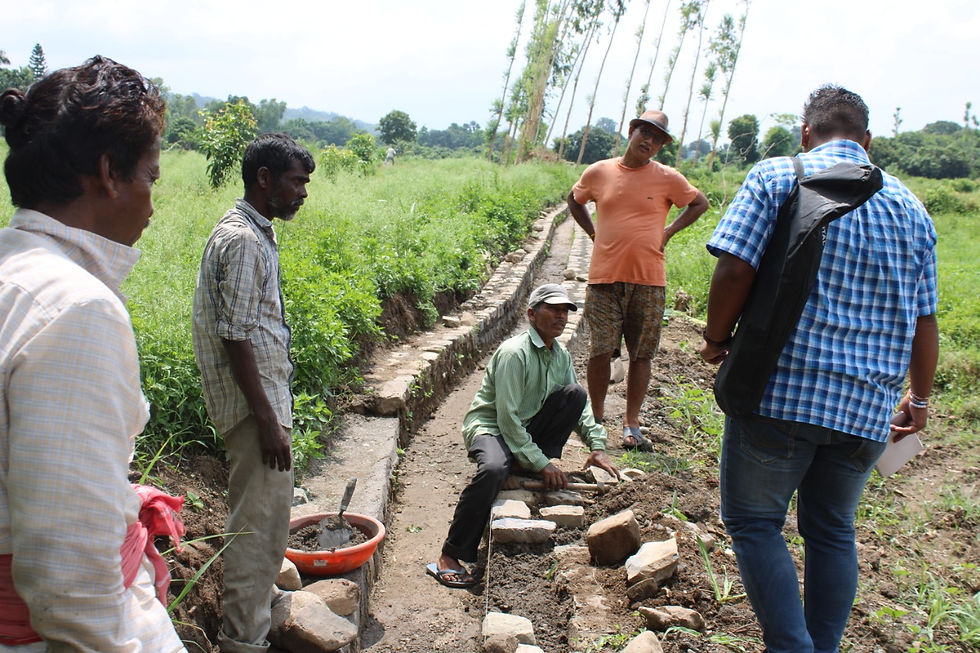Despite All Odds- Progress of PnP's ongoing projects during the Coronavirus pandemic.
- Aug 30, 2020
- 3 min read
The year 2020 began with a hope. A hope that brought out opportunity of strengthening our new projects and consolidating the learnings in ongoing projects. Little did one expect a global pandemic to strike and entire world pushed into lockdown.
It would be unfair to say that there were no learnings, there were many. The entire world, along with the “Partners in Prosperity” learned the “new normal”, adapted the new ways of working, differential strategy to address the upcoming issues were devised, proactive measures were taken to mitigate any issues arising in the future, and smart ways were discovered on doing things differently. It was discovering ones own potential and ensuring business as usual.
Gross margin survey
The Sustainable Production of Organic and Fair Trade Rice (SPOFT) projects, requiring field staff travels and regular monitoring of Rabi Crops with particular focus on Wheat, Chickpea and Lentil production and further comparing between Line sowing and Normal sowing was not an easy task. A sample of 100 farmers spread across in 13 villages of three blocks has been completed and results have been shared. Thanks to our field coordinators for their scrupulous planning and execution.


Water and Environment Groups
Water Productivity Project (WAPRO) is in its second phase. Besides the primary work, huge effort is called for in organising the Water and Environment Groups formed in villages to carry forward the agenda of Water Stewardship. Online platform of zoom and skype seemed difficult with issues of connectivity in villages and availability of smartphones with each member. Hence, each of our water animators along with filed coordinator would organise 5 -6 members of WEG, follow the norms of masks, proper sanitization and social distancing.
Demonstrations
The 100 demonstration trials set up in Uttar Pradesh and Uttarakhand were reviewed periodically, progress monitored by Jal sakhis on each indicator and results were tabulated and analysed for results. The WAPRO project also undertakes repairs of irrigation infrastructure. It was during the same time of restriction, repair of two irrigation canals, and laying of water pipeline for irrigation was completed, giving access to much needed water for irrigation, even to farmers at tail end.



Training to farmers and extension staff
Farmers training on Water efficient techniques as a strategy is key to scale up. We sought help of Dr. D.K.Singh, Agronomist at GB Pant University of Agriculture and Technology and organised series of training for farmers focusing on Water Efficient Techniques, addressing weed issues in DSR technique, Water Stewardship, and disease and pest management in Kharif crops. In the 5 training sessions organised from 31st July to `12th August had participation of over 900 farmers, and over 60 extension staff benefitted from training on 14th August and refreshed their knowledge on Organic Farming.

Biogas
The Project has constructed 3500 biogas plants (Deenbandhu Model) in Uttarakhand. The construction phase began in 2015 and repair and maintenance is an ongoing process. Due to the pandemic affect, the repair works had come to a standstill. Following the unlock guidelines repair work of 600 plants has been reinitiated. Repair and verification of over 500 plants has been achieved, and remaining plants are work in progress.
Zoom platform offered a relief in this project too allowing the project coordinator to organise training to biogas beneficiaries on operation and maintenance of biogas plants and use of slurry for composting and use in crops. In over 10 training session,182 biogas beneficiaries were able to participate.

Scaling up Nutrition Sensitive Agriculture (SUNSAI)
Identification of 600 new farmers, their survey was completed in time, as it called for a one to one contact only. Having done the survey and completed identification of farmers, 12000 fruit bearing saplings were distributed in villages of Ramnagar and Betalghat respectively.

Tribal coffee at Chintapalli
The Chintapalli Tribal Organic Coffee Project faces an additional hurdle of restricted connectivity, since the project operates in an agency area. However, activities such as establishing coffee model farms and training farmers continued by restricting the number of people in each training and maintain all safety protocols. Farmer trainings continue with more than 50 FPGs being trained in small batches.
Even during this restricted time, the staff in Chintapalli has formed a Farmer Producer Organisation in GK Veedhi Mandal under the Mutually Aided Cooperatives Act ’95. In this new mandal, they have also formed 302 new Farmer Producer Groups and followed it up with socially-distanced awareness meetings. 1054 farmers have been trained in small batches on mulching, weeding, pruning etc.
Apart from this, 94MT of arabica coffee parchment was marketed to corporate buyers and negotiations were held. With these efforts, Chintapalli MACS has been able to realise a 10.3% higher selling price than last year’s coffee season.


We are, and will be, with our spirits intact and commitment heightened than ever before, we aspire to move forward, despite all odds.







Comments